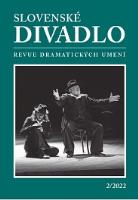Režijně-scénografická pojetí jevištního díla Claudia Monteverdiho v brněnských inscenacích
The Directorial-Scenographic Concept of Claudio Monteverdi´s Scenic Works in Their Brno Stagings
Author(s): Šárka Havlíčková KysováSubject(s): Theatre, Dance, Performing Arts, Music, Recent History (1900 till today), 16th Century, 17th Century, Sociology of Art
Published by: Ústav divadelnej a filmovej vedy SAV
Keywords: Claudio Monteverdi; Miloš Wasserbauer; Alena Vaňáková; Vladimír John; theatre; opera; Brno;
Summary/Abstract: This study deals with some of the Brno stagings of Claudio Monteverdi’s (1567 – 1643) musical scenic works. It devotes special attention to the legacy of the directorial school of the Czechoslovak opera director Miloš Wasserbauer (1907 – 1970), who was active mainly in Brno and, in the 1950s, also in Bratislava. The study is based on the research that focused on the stagings of Monteverdi’s works in the Czech lands from their first instances up to the present (2022). Since some of Monteverdi’s scenic works have recently been restaged, the author of this study asks what topics are presented to the audience through these works and what challenges these works pose, especially with respect to the directorial-scenographic concept. The first part of the study looks back at the twentieth century, when Czechoslovak theatre-makers first encountered Monteverdi; the second part deals with the present. Based on archival material on the stagings and interviews with witnesses and contemporary producers, the author introduces the possibilities of staging Monteverdi’s works depending on the changes in the awareness of, and ideas about, Baroque opera theatre and the period’s staging practices. She asks what topics or what motives are important for the producers when presenting these roughly four-hundred-year-old works to the contemporary audience.
Journal: Slovenské divadlo
- Issue Year: 70/2022
- Issue No: 02
- Page Range: 203-224
- Page Count: 22
- Language: Slovak

